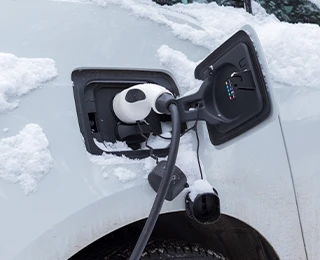How Do Electric Vehicles Perform in Winter Weather?
The answer to that question isn’t as simple as you might expect. Snow, ice, and overall colder weather will affect the performance of both gas-powered and electric vehicles (EVs). But for EV owners, there’s an added concern beyond ice on the windshield or tire tread. The lithium-ion batteries in today’s EVs can lose 40% of their driving distance when temperatures fall below freezing, according to AAA. If you’re not prepared, you could be left stranded. Thankfully, we have some tips to help you minimize that loss and tackle whatever winter throws your way.
How Harsh Winter Weather Impacts Your Electric Car
When temperatures drop below freezing, EV owners face a special kind of range anxiety. With a huge reduction in the driving distance on a full charge, it becomes extra important to locate charging stations along everyday routes. If you plan to take a longer trip, you could be forced to make extra stops along the way to avoid running out of power.
But it’s not just the lithium battery that causes a reduction in range. As with gas-powered vehicles, there’s always more than one reason for a loss in performance. Here’s how the cold weather often affects today’s EVs.
Battery efficiency, capacity, and charging
When temperatures reach 20º F or colder, lithium-ion batteries are affected, reducing range and slowing charging times. Additionally, the colder weather can temporarily reduce the total capacity of standard EV batteries.

Comfort settings
Unlike a gas-loving vehicle where heat from the engine is used to run the car’s climate control, an EV must generate that heat using power from the battery. When you warm the vehicle for you and the passengers, you will be using precious battery power. That reduces the overall range.
Rolling resistance
The tires on any car make a big difference in overall performance and safety. Colder weather can make the rubber compounds in all-season and performance tires more rigid and less efficient, which makes them less than ideal for driving in the snow and ice. When it comes to cold weather, the right snow or all-weather tires from Les Schwab can make a big difference. While you might not improve your vehicle’s range, a set of snow or all-weather tires can help you safely travel snow-covered roads.
Thickened Fluids
While EVs don’t run on gasoline and oil, many require a coolant to keep the battery at a constant temperature. When temperatures drop, that liquid can thicken causing the vehicle to work harder.
Severe road conditions
Sometimes, the road ahead requires tire chains and other traction devices. While chains and tire socks can help improve safety on snow and ice, they will reduce fuel and range efficiency due to the added rolling resistance, slower speeds, and stop-and-go traffic.
5 Ways to Maximize Your EVs Performance this Winter
When you venture out into the cold, you probably bring along a parka, gloves and wool cap. Especially when you plan to be out in freezing temperatures for a while. It’s called planning ahead. Thankfully, there are a handful of ways you can plan ahead and get the most from your EV battery in winter driving conditions.
Pre-condition the interior
While your EV is still plugged in, turn the temperature up in the cabin. Then, you’ll only need to maintain that temperature as you drive.
Park in a garage
Simply parking your vehicle in a covered area can help it charge faster and hold that charge longer.
Drive smart
When driving in winter weather, drive like you have an egg between your foot and the gas and brake pedal. The less you adjust your speed, the more range you’ll get out of your EV in colder weather. This is also good advice for safe winter driving.
Limit electricity use
Instead of heating the whole cabin, use seat warmers. And while it might not use much electricity, your phone charger, stereo, and infotainment center do use some power.
Monitor tire pressure
The air pressure in your tires can decrease by 1 PSI (pounds per square inch) for every 10 degrees the temperature drops. That drop in PSI can cause your vehicle to work harder to spin the wheels. When it gets colder, simply add air to your tires. Or stop by Les Schwab and we’ll check your tire pressure and add air for free.

Plan Ahead and Stay Safe This Winter
Before you hit the road in any weather, plan ahead, check the road conditions, and stop by Les Schwab for a free pre-trip safety check. We’ll look at the air pressure in your tires and perform a long list of other safety checks, whether you drive a gas-powered truck or an electric sedan. Plus, our pros can show you all of your EV winter tires options, including snow chains and tire socks.

